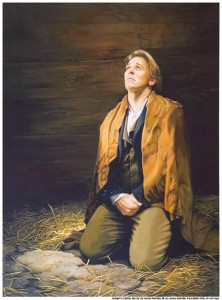Joseph Smith had gone to Colesville, New York, to meet with members of the Mormon Church there. A mob was determined to cause problems. On the evening of June 28th, 1830, Joseph was going to attend a meeting where members who had been baptized that morning were going to receive the gift of the Holy Ghost. A constable stopped Joseph and produced a warrant for his arrest. The charge was disorderly conduct. The constable saw that Joseph was a good man and told him that the warrant had been put out so that the mob could get to Joseph. The constable was determined not to let this happen, because he felt Joseph Smith was innocent. As the constable and Joseph rode in a wagon, a mob surrounded them. They seemed to be waiting for some sign from the constable, which he did not give; instead he whipped the horse and drove off with Joseph.While they were escaping the mob, one of the wagon wheels became loose and fell off. The mob nearly surrounded the two men again, but they were able to replace the wheel and escape them. The constable took Joseph to South Bainbridge in New York and paid for lodging in a tavern. The constable was so determined to protect Joseph, that he slept that night with his feet against the door holding a loaded musket.The next day Joseph went to court. The mob had convinced many people to make false accusations and tell lies about Joseph’s conduct. Joseph Knight, a friend of Joseph’s, had gotten two very respectable men; James Davidson and John Reid to testify on behalf of Joseph. During the trial Josiah Stoal, a man Joseph had once worked for, was called to testify against Joseph. In the History of the Church, which was dictated by Joseph Smith, Joseph records what was said in Josiah Stoal’s testimony: The mob nearly surrounded the two men again, but they were able to replace the wheel and escape them. The constable took Joseph to South Bainbridge in New York and paid for lodging in a tavern. The constable was so determined to protect Joseph, that he slept that night with his feet against the door holding a loaded musket.The next day Joseph went to court. The mob had convinced many people to make false accusations and tell lies about Joseph’s conduct. Joseph Knight, a friend of Joseph’s, had gotten two very respectable men; James Davidson and John Reid to testify on behalf of Joseph. During the trial Josiah Stoal, a man Joseph had once worked for, was called to testify against Joseph. In the History of the Church, which was dictated by Joseph Smith, Joseph records what was said in Josiah Stoal’s testimony:
Others were called to testify against Joseph, but nothing was found to charge him. Joseph was acquitted, but those who were his enemies had detained him long enough to get a warrant for his arrest from Broome County, and the moment he was acquitted, they issued this warrant and again arrested him. The constable of Broome County was an unkind man and insulted Joseph. Joseph had had nothing to eat all day, but the constable insisted that they immediately leave for Broome County; which was fifteen miles away, before Joseph was allowed to eat. He took Joseph to a tavern in Broome County and allowed men to come in and ridicule Joseph. They spit on him and pointed their fingers and yelled out “prophesy, prophesy.” They were not far from Joseph’s home, and Joseph asked to be allowed to stay at his own home and offered many things promising that he would appear at the court hearing, but the constable would not allow this. Joseph then asked for something to eat, he was given only a little bit of bread and some water. The next day Joseph’s second trial began. Both James Davidson and John Reid acted as lawyers for Joseph during the trial. Many witnesses were called against Joseph; most of them lied about Joseph’s character and actions. This was apparent to the court and it did not allow their testimonies to be taken into account. Newel Knight was then examined:
Following this witness the prosecuting lawyer Mr. Seymour again tried to convince the court of Joseph’s guilt in his closing argument. Then Mr. Davidson and Mr. Reid were allowed to begin defending Joseph. They were able to convince the court of Joseph’s innocence. When they were done, those who had watched the trial felt very differently about Joseph; even the constable who had treated Joseph so terribly apologized to Joseph after the trial. Joseph was acquitted. Mr. Reid recorded this event which happened after Joseph was acquitted:
The constable informed Joseph that he knew that the mob was determined to get to Joseph and tar and feather him, so he led Joseph out of court through a private door to protect him and Joseph arrived safely at his home the next day. See the next article in the timeline series. Other Links: |
